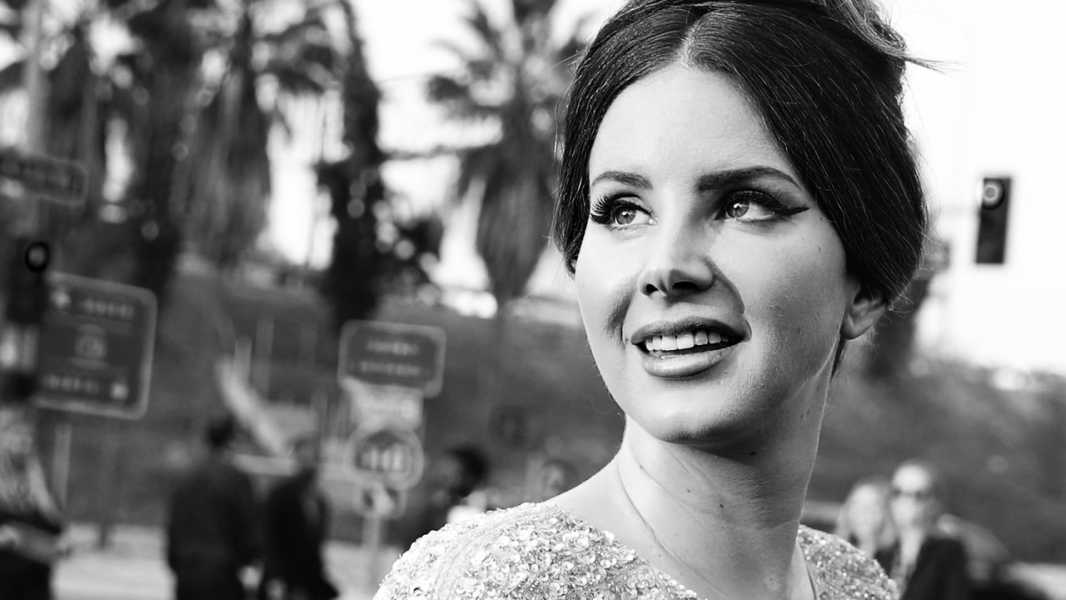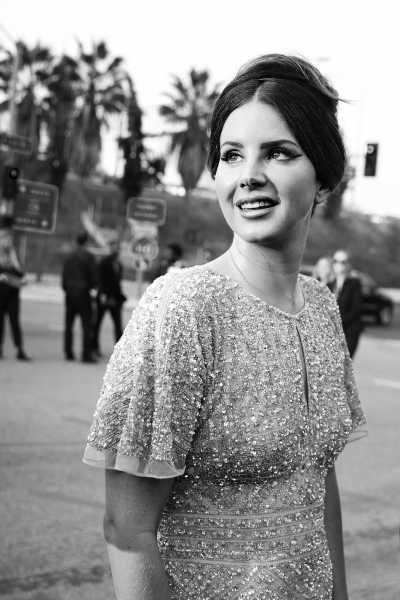
Save this storySave this storySave this storySave this story

Lana Del Rey doesn’t toy with signs—of American glamour and its decay, of female melancholia and racial desire—so much as consecrate them.Photograph by Rich Fury / Getty
One thing about Lana Del Rey is that she’s a bit of a silly goose. She’s also a believer, and these two qualities are not only compatible but mutually sustaining. By saying “silly,” I’m not referring to—though I am by no means excluding—such behavioral quirks as misplacing her vape on stage, or wearing a mesh mask to a fan meet and greet at the height of the pandemic (as she later clarified, it had a plastic lining!), or posing for a photo with her boyfriend in front of the sign for a Chicago correctional facility. I am talking about the small farces that escape as a by-product of an earnest go at formulating and expressing an idea, which is to say, making art. The appraisal of Lana Del Rey’s persona as somehow satiric has stuck to her ever since fans grappled over the whole Lizzy Grant thing (that is, the fact that an alt-pop sensation with a Spanish name and a too-cool California air was also a white-bread East Coast boarding-school alum named Elizabeth Woolridge Grant). Del Rey wasn’t a poser, the thinking went, so much as a satirist. It helped that the music was too good to dismiss. But the label of satire was never quite correct, either. Del Rey doesn’t toy with signs—of American glamour and its decay, of female melancholia and racial desire—so much as consecrate them, spinning new iconography out of ratty old icons with a faith so full-blown that it sometimes appears irreverent. I’m talking about tracks like “Art Deco” or “Coachella – Woodstock in My Mind” or “White Dress,” in which touchstones of different eras and places are estranged from their original contexts yet become more bewitching for how they brush against one another.
On “Did you know that there’s a tunnel under Ocean Blvd,” Del Rey’s ninth studio album, released this past Friday, she incorporates the self as a subject worthy of a similar technique, alighting upon allusions and faithfully searching for signs. The album continues an arc in Del Rey’s recent work toward the personal, if not necessarily the autobiographical. “Chemtrails Over the Country Club” and “Blue Banisters,” both released in 2021, distinguished themselves from her prior projects with their muted theatrics and lived-in settings—California but also Oklahoma and Florida—eschewing vignettes in favor of patient storytelling. The shift was aided by new instrumentation: piano and acoustic-guitar picking in lieu of a swelling orchestra, as on “Ultraviolence,” or 808s and hi-hats, as on much of “Lust for Life.” (Jack Antonoff, who’s written and produced alongside Del Rey on two prior albums, supplies a number of instrumentals on the new one.) “Did you know that there’s a tunnel under Ocean Blvd,” with its topographical title and title track, might seem to herald more regionalia in that earlier vein. Instead, its central subject is placelessness, in more and less theological terms. Del Rey is interested in the search for the transcendental, in that old American tradition, and, as in most national pastimes, there is ever room to sound a bit dippy.
The piano on this album is a drifting instrument, complementing vocals that are more interested in departures than in remaining in scene. “Paris, Texas,” a tinkling waltz with accompaniment by SYML, begins with an exit: “I went to Paris (Texas) / With a suitcase in my hand / I had to leave.” On the sixth track, “Candy Necklace,” featuring Jon Batiste on the keys, Del Rey’s slurry, breathy syllables run together, meeting the tempo one moment and comfortably lagging behind it the next, as if her highs and lows were chasing one another. “You’ve been acting pretty restless / Dancin’ like the young and restless,” she sings. In the interlude that follows, named after Batiste, it’s as though we are privy to improvisational cutting-room-floor material from the preceding track. The song sounds echoey, tunnelled; from far away, Del Rey trills the word “honey” and Batiste cries out, laughing while the piano playing persists, “I can feel it in my soul!”
Indeed, there’s something revivalist, even Pentecostal, in the album’s intonations. The opening track, “The Grants,” begins with the soulful a cappella harmonies of Melodye Perry, Shikena Jones, and Pattie Howard. They sing and Del Rey repeats: “I’m gonna take mine of you with me / Like ‘Rocky Mountain High’ / The way John Denver sings.” The song is held aloft by rhetorical questions: “So you say there’s a chance for us?”; “Do you think about Heaven?” The song considers living a form of being left behind. On “Grandfather please stand on the shoulders of my father while he’s deep-sea fishing,” Del Rey calls out to the heavens in a brilliant, clear yowl, and on the title track she asks not to be forgotten like the closed-off “tunnel under Ocean Blvd.” There is something bathetic in hearing the song’s long-winded title unfurled in the lyrics, a reminder of the line between spiritual quest and emo indulgence.
That track and others on the album have family at the fore, among them “Fingertips,” on which Del Rey sings of “Dad, Grandma, Grandpa, and Dave / Who hung himself real high.” The seeming references to real-life people and events—Del Rey has spoken about her uncle Dave Grant’s death by suicide, in 2016—invite a biographical interpretation of the album, a presumption of intimacy with the artist behind the sound. But Del Rey’s voice, which has become increasingly acrobatic over time without losing its signature timbre, persistently reminds us that we’re listening to a song and not a facsimile of reality. She always sings at a writerly distance, in wails and whispers by turns warm and thin, as though laying down the soundtrack to a fictionalized account of true events. Whether the first person here is autobiographical or archetypal, the album ponders transcendence through the exigencies of family and its built-in tragedies. On “Did you know that there’s a tunnel under Ocean Blvd,” all this pondering is captivatingly warped by the language and the soundscapes of American belief. The album’s second single, “A&W”—its title dually invoking the classic root beer and what the lyrics describe as “the experience of bein’ an American whore”—is split in two, its initially ruminative mood cut by a gum-smacking, bass-heavy interpolation of the 1959 R. & B. record “Shimmy Shimmy Ko-Ko Bop,” by Little Anthony and the Imperials. The album, like the artist, exercises its prerogative to change.
These are full, refreshingly patient songs. (None of them is shorter than three and a half minutes, and several are longer than five.) Yet, thank goodness, “Did you know that there’s a tunnel under Ocean Blvd” ultimately lets go of the possibility of deliverance. Even “Judah Smith Interlude,” named after the Hillsong pastor who hollers throughout the track, is overlaid with a giggle. The closer the album gets to its end, the more what came before seems like a beautiful, transitional meditation—a lovely case of the vapors. “Margaret,” featuring Antonoff’s band Bleachers, and taking the name of Antonoff’s fiancée, Margaret Qualley, announces itself as “a simple song . . . for a friend.” By the time we get to the schoolyard rhymes of “Peppers,” featuring a sample from Tommy Genesis’s “Angelina” (“Hands on your knees, I’m Angelina Jolie,” they both chant), Del Rey seems to have arrived at a boppier state of being.
The final track, “Taco Truck x VB,” opens with well-loved Del Rey motifs: the boyfriend, the vape, the maybe sex, the color blue, violence. On the chorus, over kit drums and guitar, she sings, “Oh, that’s why they call me Lanita / When I get down, I’m bonita / Don’t come find me in Reseda / I’ll go crazy.” It’s a breezy provocation harking back to the fuss surrounding the Del Rey pseudonym, but all of that feels so far behind us by now. As many of my fellow-millennials have thankfully come to recognize, making music is an exercise in playacting, and authenticity is less about one’s reality than about persuasive world-making. To that end, “Did you know” creates a web of self-referentiality, a dense index of past music and past selves. Midway through “Taco Truck,” the song slides into a version of “Venice Bitch,” which originally appeared on Del Rey’s lauded 2019 album, “Norman Fucking Rockwell!” The song has been reinvented, sped up, given some of the trap flair from which the earlier album had notably departed. It’s something less than a remix, more than a cover: a self-interpolation, perhaps. Another icon up for grabs. ♦
Sourse: newyorker.com